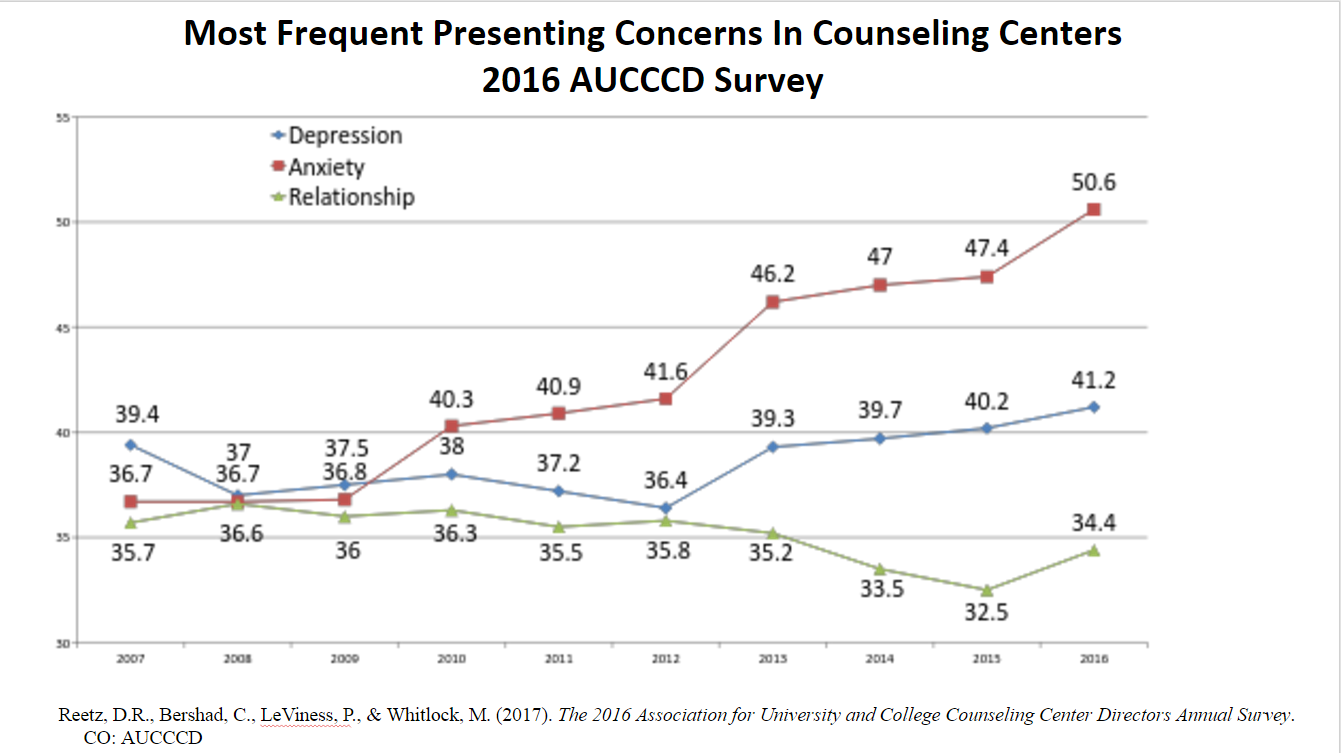 This post is an entry for Part III of the Mentally Healthy resource guide for UP faculty and academic staff working with students who might have mental health concerns.
This post is an entry for Part III of the Mentally Healthy resource guide for UP faculty and academic staff working with students who might have mental health concerns.
The bad news: data suggests that colleges and counseling centers are finding increasing needs for mental health services in ways that stretch capacity and create concern about a “fragile” generation. The good news: much of this increase in need may relate to the destigmatization of mental health concerns among younger generations, and opportunities for students to persist with education in the face of challenges that may have previously gone unacknowledged. Working with college students thus requires a combination of concern, recognition, understanding, and encouragement.
While the story of mental health concerns among college students is multi-faceted, the increasing recognition of these concerns comes with an increasing value to mental health literacy among faculty and staff. While there are many educational opportunities to develop that literacy, here I’ll just highlight and offer a brief overview of the three most common. As reported in the Association for University and College Counseling Center Directors Annual Survey, these are: anxiety, depression, and relationships.

Anxiety concerns can range from relatively common concerns about academics, social situations, and finances to more profound psychological disorders – which often onset around the typical college age. One challenge with anxiety disorders is that some degree of anxiety is normal and adaptive — feeling nervous about a big exam can help us prepare, while being anxious about unfamiliar social situations can keep us safe. But it is easy for these stressors to step over an imaginary line to become debilitating and disruptive. Here’s how the American Psychological Association describes the most common ways anxiety manifests when it steps over that line:

Depression often overlaps with anxiety, and it too often starts with relatively normal experiences – a low mood or periods of sadness can be quite normal when dealing with the new challenges of college life. But major depression is often diagnosed when those moods are disproportionate to life events, and when they become disruptive to regular functioning. Depression is diagnosed based on a constellation of symptoms that do not necessarily look the same across individuals. But, as illustrated by a Huffington Post infographic, there are some common physical and emotional manifestations (not all of which need to be present for any one individual diagnosis):

Relationship concerns can also come in a wide range of forms – from romantic, to roommates, to parents, to professors. Jeffrey Jensen Arnett is a developmental psychologist who did much to define “Emerging Adulthood” as a new stage of the lifespan where many, including most traditional age college students, engage in intensive identity exploration around love, work, and worldview. He also argues that relationship expectations are less structured than in the past – parent-child relationships have to be re-normed when kids leave for college, but most are not just left on their own; romantic relationships are more diverse and less bound by cultural norms and expectations. This can be disorienting, and requires skill building. Some relationship issues relate to interpersonal violence, and need to by addressed through mechanisms including the Title IX office. In other cases, students simply need support for building skills to have healthy relationships.
More good news is that all these types of concerns can in fact be addressed through quality counseling and support. When we as faculty and academic staff recognize the need in our students, make the right referrals and know that the very commonness of these concerns means they can be, and regularly are, successfully navigated as part of the college experience.
Photo by George Pagan III on Unsplash
